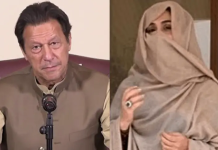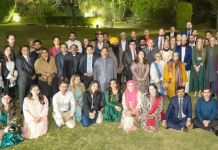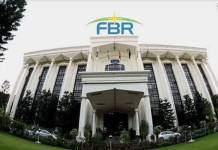By
Qamar Bashir
Former Press Secretary to the President
Former Press Minister to the Embassy of Pakistan to France
Before refusing to obey the supreme court’s order to hold Punjab Assembly Elections on May 14, the government should consider the supreme court’s overarching jurisdiction and powers as granted by the constitution. It should be aware that the Supreme Court of Pakistan is the country’s highest appellate court and the court of last resort, the last word on the law and the Constitution which are binding on all other courts in the country, and all executive and judicial authorities. Furthermore, the Constitution entrusts the Supreme Court with the unique responsibility of maintaining harmony and balance between the three pillars of the State. The Supreme Court is not only an appellate forum, but it also has original, appellate, and review jurisdiction to settle intergovernmental disputes between the Federal and Provincial Government(s) or Provincial Governments inter se, and it can also exercise original jurisdiction to enforce fundamental rights if the case involves a public issue.
A government’s refusal to disobey a Supreme Court decision can have significant legal, constitutional, and political ramifications. Legally, refusing to accept the orders is a violation of the law, and will result in legal action against the government, including contempt of court charges and further directions from the Supreme Court to enforce its decision through kinetic elements of the state.
The constitutional implications are far more serious. Supreme Court decisions are binding on all branches of government, and failure to obey is a violation of the constitutional order, which may result in death or life imprisonment. A public official who violates the Constitution may be impeached, removed from office, or subjected to other disciplinary measures. The Supreme Court can also declare a government action or law unconstitutional and order it to be repealed or modified.
Politically, disobedience could harm the government’s credibility and legitimacy, sparking a public backlash and resulting political unrest, providing the opposition and civil society groups with a once-in-a-lifetime opportunity to mobilise the masses against the government, eventually leading to a constitutional crisis, prompting other branches of government or even international organisations to intervene.
The government should be aware that the war between the executive and the judiciary always favours the courts. President Richard Nixon refused to comply with a Supreme Court order to release secret White House tape recordings related to the Watergate scandal in United States v. Nixon (1974). This resulted in a constitutional crisis and, eventually, Nixon’s resignation. Brown vs. Board of Education: Several southern states rejected the Supreme Court’s decision to desegregate public schools. This created a legal and constitutional crisis, necessitating federal government intervention to enforce the court’s decision. Cooper v. Aaron (1958): Yousaf Raza Gilani was removed as Prime Minister of Pakistan on June 19, 2012, after the Supreme Court of Pakistan found him guilty of contempt of court. Gilani was automatically barred from holding public office for five years under Article 63(1)(g) and was later removed from the premiership. In India, the Indian government passed a law in 2016 allowing Jallikattu, a traditional bull-taming sport in the state of Tamil Nadu that had been banned by the Supreme Court in 2014, sparking protests and legal challenges, and the matter was eventually remanded to the court. In Sri Lanka, President Maithripala Sirisena attempted to dissolve parliament and call new elections in 2018, despite a Supreme Court ruling that the move was unconstitutional. The decision was widely protested and condemned internationally as a threat to the country’s democratic institutions.
The government should also be aware of the international implications of defying the supreme court’s decision, which could be interpreted as a violation of the rule of law and human rights, leading to criticism from other countries and international organizations and harming the government’s reputation on the international stage. It may also face economic sanctions or other measures imposed on a government, which could have serious economic consequences, such as lost trade and investment and harm to the country’s financial stability. It may also face diplomatic isolation from other countries and international organizations that refuse to engage with it on specific issues, and international law may provide mechanisms for holding governments accountable for violations of human rights and could include referral to international courts or tribunals, as well as other forms of international legal action.
The government may be considering using parliament to overturn the Supreme Court’s decision, but it should think thousands of times before doing so. In democracies such as Pakistan, the parliament does not have the authority to overturn a Supreme Court decision or \interfere with the judiciary’s decision-making process. A Supreme Court decision is typically regarded as final and binding, and its interpretation of the law is regarded as the last word on a legal issue.
Other institutions should not even consider defying the supreme court’s order, as this would constitute contempt of court, which can result in fines or imprisonment. The Supreme Court may issue an injunction prohibiting an individual or institution from taking or refraining from taking certain actions; noncompliance would result in a fine or imprisonment. The Supreme Court may issue a writ of execution, which directs law enforcement to carry out the court’s decision. The Supreme Court may review the constitutionality of laws or the actions of government officials, and if the court finds that a law or action is unconstitutional, the law or action may be struck down or declared invalid.
The government may additionally have looked at declaring a state of emergency to avoid implementing the Supreme Court’s decision because, while the government can suspend certain legal and constitutional protections in response to a crisis or threat to public safety or national security, it cannot use it as a tool to subvert the rule of law or avoid compliance with a Supreme Court decision. Furthermore, it could have serious consequences, both domestically (undermining public trust in the government and the judiciary, leading to protests and unrest) and internationally (damaging the country’s reputation and leading to diplomatic isolation). Above all, According to Article 232 of the Constitution, the President may declare a state of emergency if he believes that a grave threat to Pakistan’s or a portion of its security exists, whether from war, external aggression, or internal disturbance. Within 30 days, the declaration of emergency must be laid before both houses of Parliament and approved by a two-thirds majority. Because the government lacks a president and a two-thirds majority in parliament, this option is out of the question.
The government appeared to be out of option for sending reference to the Supreme Court, despite the fact that Article 186 of the country’s constitution allows the President or Governor of a province to seek the Supreme Court’s opinion on any question of law or public importance. However, the government should be aware that a referral is not the same as an appeal. A reference is a nonbinding request for the Supreme Court’s opinion on a specific question of law or public importance. The Court may accept or reject the reference, and its decision is not enforceable in the same way that a court judgment is, but the government must comply with a Supreme Court decision while a reference or appeal is pending. Furthermore, they must overcome the most significant impediment: only the president has the authority to file the reference, which we all know the President will not do.
The government has two options in this situation. It is now pledging not to accept or implement the decision, vowing to overturn it through a parliamentary act, considering nullifying it by declaring a state of emergency and referring the matter to the Supreme Court to reconsider its decision. All of these options are doomed to fail, bringing the government more indignation and humiliation. Accepting the decision with dignity and character is the second option. It has no choice but to comply with the ruling without delay in order to demonstrate its respect for the rule of law and the Supreme Court’s authority. The government should publicly acknowledge and respect the decision, even if they disagree with it to gain public trust. It should communicate clearly with the public about the decision and how it plans to implement it to avoid confusion and misunderstandings. It should collaborate with the judiciary to ensure that the ruling is carried out in accordance with the law and the Constitution. This will enable it to reclaim some of the political capital it is rapidly losing and prevent Shahbaz Sharif from following in the footsteps of Yousaf Raza Gilani.

















